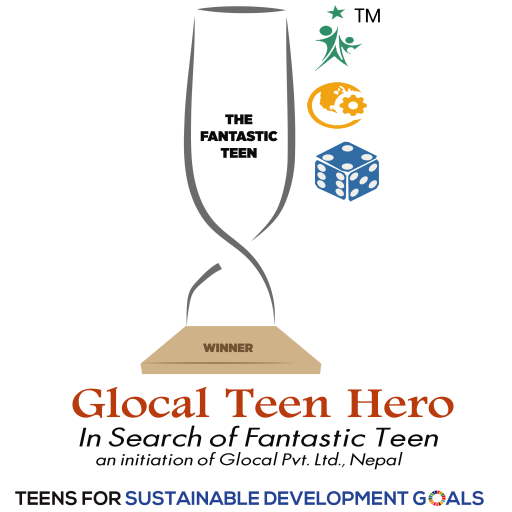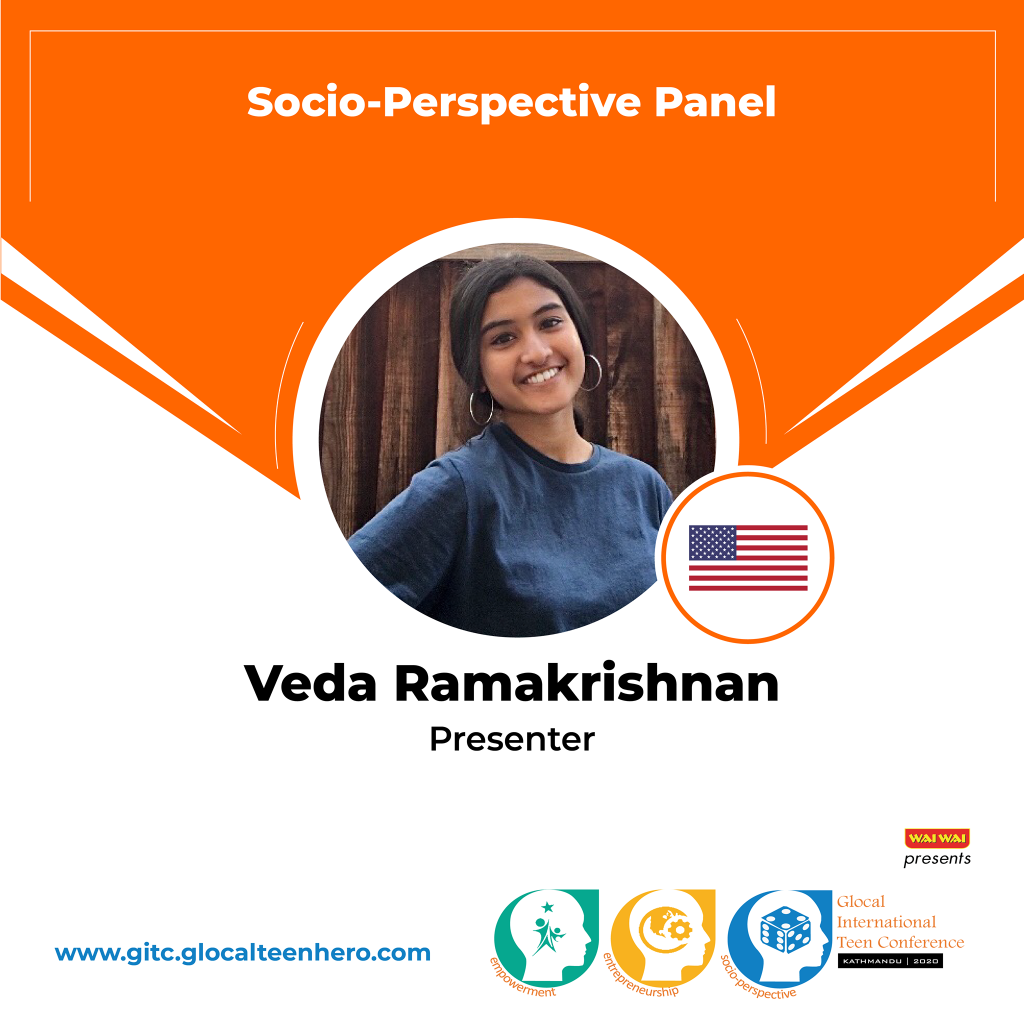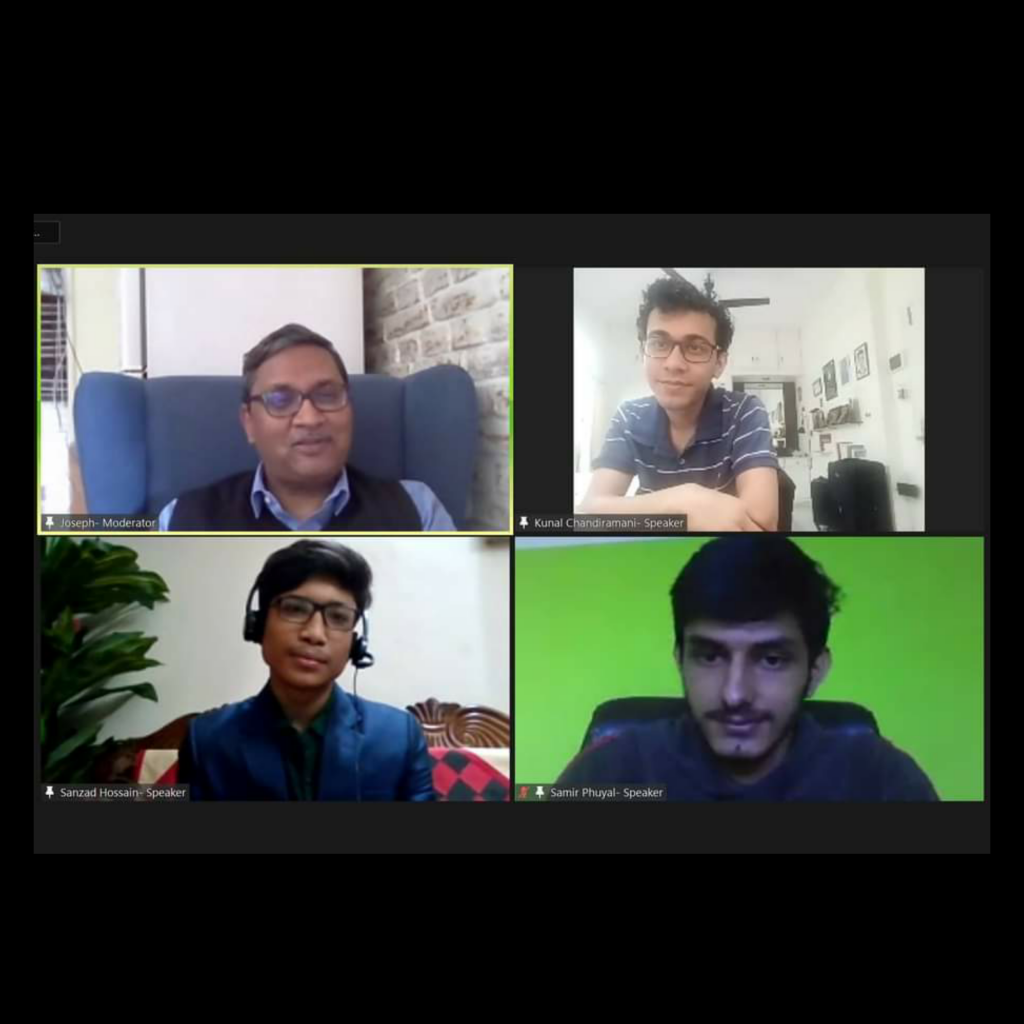Introduction
Glocal International Teen Conference (GITC) is an opportunity for teenagers to address the issues and overcome the challenges that they have faced in their daily lives. It is a platform for all the teenagers from age 13 to 19 to learn, empower and bring social impact through a participatory and interactive environment with their peers from all over the globe. The three key issues of GITC are Entrepreneurship, Empowerment, and Socio-Perspective. It is a lifetime experience to connect with the influencing teenager and act for a positive change. Glocal International Teen Conference was organized virtually on Dec 10 & 11, 2020.
Speaker and Moderator of Empowerment Panel
An empowerment panel session was moderated by Ms.Taniya Goyal, currently working with a Nepal based NGO, Daayitwa – that works towards building an enterprising Nepal. She has created an empowering environment with four young speakers from different South Asian countries. The speakers were:
- Mr. Dipro Prattoy, Youth Activist from Bangladesh;
- Mr. Rhythm Sah, Youth Activist and Motivational Speaker from Nepal;
- Ms. Nguyen Ngan Ha, Founder of SHARING, an educational charitable project in Vietnam;
- Ms. Supriya Maharjan Sapkota, Social Activist from Nepal
The empowerment panel discussion highlighted individual opinions and empowered teenagers to solve social issues. The discussion also increased teenager’s participation to act for a positive change through individual initiation and creativity.
Here is the gist of the beautiful panel discussion:
Moderator: Today, in many parts of the world, we talk about shaping a better future for the next generation. Does this question raise what should be changed in the world to make it a better place?
Rhythm: When we talk to improvise or change things to give a better world to the next generation, I think we are struggling today, with different ideologies, talking about gender inequality and all the other problems in our society. It has been the legacy of how we were previously protecting our world. But with the younger generation coming in with the help of education and all the resources we have now, I think it’s time we can change the time, and we can teach in schools, colleges, and even go to villages and teach them about these things because we cannot change. I think it is almost impossible to change the ideas that people have in their minds. But we can change the new mindset for the coming generation. And I think that is how we can change the world and make it a better place.

Rhythm Sah, Youth Activist & Motivational Speaker
Moderator: Could you tell us a little bit more about your experience?
Dipro: Yeah! Thank you so much, mam. First of all, I’m privileged to be here amongst the notable speakers. In front of you, I couldn’t have asked for a better moderator.
Talking about this particular thing, I would like to compare two things first; if we compare global warming with COVID-19, they are pretty much the same thing. And that’s happening because of us, individuals. If we think about global warming, we might have heard about the thing that we should never use CFCs products, but we keep doing things that are causing global warming. Because we think,” I am just one individual out of 7 billion people.” Similarly, in the case of COVID-19, we are always told to wear a mask and we are like, “I am just one person, nothing will happen.” Thus, this is our mentality. We believe,” I am just one person out of 7 billion people hoping to bring a change”. But the thing is, this is circulated to every single youth out there. And as a result, people cause the same mistake.
Thus, I believe that there are so many problems operating in the world. Despite our awareness, we are not able to do that. That is not possible. So the first thing that we as individuals must be doing is to change our mentality and the way we approach a solution. So, it can be anything. It can be a simple issue as cyberbullying as complex as trying to solve all the rape cases of Bangladesh or Nepal. But the challenging part is we humans do not understand to see is the first step. Everyone says that the first step is the most difficult, but I think that the first step would make this world a better place. So yeah, we have to change our mentality first.
Nguyen: First of all, I am thankful to the organizers for providing us the opportunity to voice our opinions on social issues.
Talking about the question, I think to change our society the youth today should start first by changing their attitude. Well, changing our attitude may seem to be challenging. However, starting with simple actions such as taking a step back and discover what is happening around you. I think you can start with such information these days with the help of the internet and your connections. Observing the things around you opens your mind to seek help from your friends and families. You can pinpoint the positive things around you. I think adopting a positive attitude to start with something small is the best choice rather than the big stuff. For this, we can starts working with your local community and make it persistent and help the underprivileged people.
To scale up your activities to make some changes in society, I think the changes should not be abrupt but should happen gradually, consistently to reach everyone possible. So, yeah, I think that’s great how people today should change.
Supriya: Thank you so much for your question. I believe our co-speakers have covered many aspects, but I would like to cover abundant opportunities. In Nepal, when I started working three years back, the younger generation was not much privileged. I was lucky that I came from St Mary’s, and my school provided me with a heck of opportunities to explore, reach out and see beyond the line. In short, my school provided me with a prospect for my growth. But in Nepal, there are many schools, who don’t believe in growth learning. They’re more into bookish knowledge, and they don’t open the doors for their children to go out and explore it. So even though there are so many aspects that need to make a change for our next generation. The most important thing, until and unless we don’t let them explore their horizons, we cannot expect them to go out and change other’s lives. So at the very first please I believe that they need the floor where they can know about themselves, explore about themselves. As we all know, school is the place where we learn. Studies are a vital essence of life, but along with ECM, a child develops their personality. So, if you want to have a better future or desire to create something for the next generation, we must let them explore. Some so many children are eager to learn skills and are enhanced to change the world.
Moderator: Had your cultural context hampered or enabled your efforts at enhancing youth empowerment in your countries. Are there any challenges that you faced in your journey?
Dipro: I would first talk about my cultural background. In the first place, their judgment on the color and height of people. It sounds weird and freaky. So often, even I am treated based on my religion. So, my mom belongs to a Buddhist family, and my dad is from a typical Hindu. Here, I come from a country that is majority Islamic. So people asked me usually which religion do you follow and I always said that I follow both religions, they are different but in the end; they both teach you the same thing and that is to be peaceful. And in my case, I follow both Hinduism and Buddhism, which means during Diwali I celebrated to the fullest. And during Buddhism, I used to celebrate to the fullest. And most of my friends are Bangladeshis and Muslims, and I used to celebrate with them to the fullest. In my opinion, people do not actually understand it; every single religion can be made equally diverse and enjoyable.

Dipro Prattoy, Youth Activist
Similarly, In my case, I can say, it has hampered my life in a positive manner. When I started my career at an early age, only a person I had in my organization, that is me. I used to tell people, can you please join my organization. People usually used to tell me,” You are just 14, and you came here to bring a change, and bring a difference in society.” For me, the first step is actually the hardest step but slowly and gradually, it can lead to being more successful in life. Right now in my organisation, we have people from all the religions or all ethnicities of the world, which basically shows that the first step was the hardest step. It is just that when people take these things as the biggest priority, rather than bringing change as the biggest priority. That is when the world actually faces a lot of problems. I believe if we can change the mindset of people, we can easily change our overall generation.
Moderator: How would you like to share?

Nguyen Ngan Ha, Founder of SHARING
Nguyen: In Vietnam, people have now become very familiar with extracurricular activities, Through my process of working philanthropy activities like donation, making donations or fundraising activities. I think young adults in Vietnam are really interested in it and have become more open to that. In terms of empowerment for underprivileged people, we had a long tradition of protecting each other and solidarity; which means they were supportive and could do anything to improve the lives of other people. However, in some cases, activators of content, this is kind of a modern concept or hardly touched contracts in Vietnam which takes much longer time to make people fall in grasp the concepts, and then take action to make them.
Supriya: So, talking about cultural context has given me positive as well as negative impacts on the youth environment. First getting into the negative impacts; I believe that in Nepal or in South Asia countries, there is the same issue about gender inequality.
Through my experience, the first thing that I have seen is; even if you are going somewhere for the training session, girls are not allowed to take to the sessions. The problem is that girl children are not sent to schools and they are devoid of those sessions. They are always fed up with the insecurity and can’t even face upward or can’t even speak about the insecurity. Last year when I was giving a session about CSH including menstrual hygiene. In the session, both girls and boys were in the class but during the session, the girls didn’t even ask a question. Later on, girls separately came to me and asked questions. So rather than saying religion, I would say it is the environment that we grew up in. It is the influence that we always got that we should not have comfortable talks. Social culture has hampered it a lot because people in rural areas where even they are not even getting a basic level of education.
Talking about the positive impact rather than empowerment, I would like to talk about when it comes to donation. I am donating to educate girl children, or I am also involved in street dog care. So, in the cultural context, it helped me a lot. In our country, dogs are worshipped as to be an incarnation of God. Therefore, people are willing to give donations, food, and money. Thus, this religious stuff has helped me a lot to garner donations for our children.
Rhythm: As we talk about cultural background, I lived in Kathmandu for 14 years. I have friends from all backgrounds. I also got an opportunity to celebrate different cultural traditions, which helps to give me the power to connect with people very well. We can accomplish so many workshops to motivate youngsters. But we do face challenges as well. So, the first challenge we usually face is convincing the schools for extracurricular activities. It’s not just about giving formal education, but about the overall growth of our children. That’s the constant battle going on, and I think these are the challenges.

Ms. Taniya Goyal, currently working with a Nepal based NGO, Daayitwa
Moderator: What do you think today’s world needs to improve upon for a better and happier world?
Nguyen: I have pretty much covered in terms of mindset and kind of social issues. I think in order to build a happier world. We need to become happy which will begin to make a complete, clean and happy society. So, like, being happy yourself, depends on your own definition of happiness. It can start from a few basic care activities, achievement or larger goals. In order to build a happier world, we should also engage other people in the process but this is a very long term battle against social issues. So, the bottom line is to stay happy and fulfilled yourself, and then spread such happiness to other people through gradual action and constantly update on the social issues, so that your actions will be beneficial to you.
Rhythm: When it comes to improving, I think we need to improve the negativity that has been spreading throughout social media. Although, it has been creating a lot of negative impacts on youths. We all know; we all use Facebook, Instagram, or social media platforms, which also cover the awareness part. People are also working towards making people aware and educated. They are training companies like mine, and also organizing different workshops as well. But one thing is negativity which has not been covered on social media platforms. I think this is one of the first things that need to be controlled. Because it has been creating a lot of mental problems for a lot of young people out there. I think these things need to be done or changed. In my four years of journey, I have learned that things don’t happen overnight, it takes a lot of time for things to come into place. So, that’s why we need to be more patient.

Supriya Maharjan Sapkota, Social Activist
Supriya: The first step of happiness is inner happiness. It’s like a self-exploration. In my life, when I started social activism, I didn’t start it because I wanted to work for the sake of society. I wanted to help others. But I was at a phase where I was facing some personal crisis. I just wanted to be happy for myself. Meanwhile, when I was in this process of making myself happy, I realized it reflects other’s life as well for making them happy.
For me or in the field of my activism, in the first phase, all I did was to make myself happy. If you start loving yourself, you will do a lot to make yourself happy. And when you are working or doing something positive, it creates the ripple effects of the vibrations. If you are doing something positive or you believe in good energy lines that will give you positive results but if you are connecting into those lines or you are doing some bad work, it will always result in bad vibes and negative energy. If you’re doing something that you are truly interested in, and if you are truly motivated to, then it will give out positive vibes.
First of all, look towards making yourself happy. And when you work for that, you become compassionate towards other people as well. You get that eagerness to give to others who are unfortunate to get those opportunities. And that’s how the ripple effect goes on. Realizing, and then giving out, and then getting in. So, I believe that’s the way to make the world a happier place.
Dipro: Everybody says that once you meet your idols, they call in your eyes because everybody has flaws. I believe that we should all stop idealizing people because we should be the idols of ourselves. The world is going to change me and my identity, and also your name. And I think that together we can make this world better.
Conclusion
The empowerment panel discussion ended with such a nice note on regional connectivity. The session provided an opportunity to have new insights and ideas from the inspirational teenagers for sharing their interactive stories and also sending a great message that teenagers in fact are the true change-makers of society on the platform of the Glocal International Teen Conference 2020.


